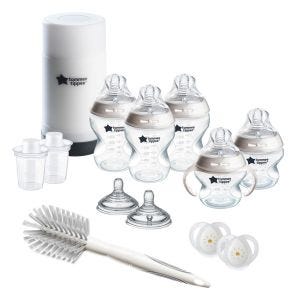
This is a demo store. No orders will be fulfilled.
Subscription orders can be cancelled at anytime. Free delivery on all subsequent subscription orders. Find out more about subscriptions.
They’re easy and fuss free
Your products are automatically sent to you
You save up to 10% when you sign up for a subscription
You can cancel at any time
Breastfeeding provides your baby with all the nutrients they need during the first months of their life and provides you and your baby increased protection from illness and disease.
Let's take a look at some of the benefits of breastfeeding and why it's so good for both baby and you.
Breast milk provides the ideal nutrition for baby, especially in their early development. It contains all the nutrients, proteins and hormones they need in all the right proportions. In fact it changes throughout your breastfeeding journey, according to what your baby needs, especially during their first month.
During pregnancy your boobs do some amazing stuff, and we're not just talking about them getting bigger. From about 16-22 weeks into your pregnancy your breasts will start producing a thick yellowish fluid called colostrum. This is an early, concentrated form of breast milk, packed with nutrients and disease-beating antibodies.
Colostrum is the ideal first milk for your baby as it's gentle on their delicate digestive system. There may not be very much of it, but it really is a wonder food, and some mums collect it before baby arrives, to help ensure that baby gets the benefit of this early breast milk even if early attempts at breastfeeding prove to be a challenge, this is known as Colostrum Harvesting.
After the first few days of your baby feeding at the breast, your boobs start producing larger amounts of milk as your baby's stomach grows.
In the first few days following the arrival of your baby the precious time that baby spends at the breast promotes the production of your milk supply. Around day 3 you will notice that your milk supply has increased and your baby will be getting more volume at each feed.
Breastfeeding can help to reduce your baby's risk of:
Breastfeeding can also reduce the likelihood of your baby developing allergies such as asthma and eczema. And studies have shown that breast milk can improve the brain development of young babies.
There are some studies that show that breastfeeding promotes baby's healthy weight gain and helps prevent childhood obesity.
Babies naturally regulate how much milk they take in as their digestive systems develop. They will suckle until they've satisfied their hunger, which may help them develop healthy eating patterns as they grow.
Breastfeeding needn't cost you anything. There's very little that you need other than your boobs and maybe some breast pads.
Breastfeeding means you don't have to:
Unless you are expressing you have nothing to wash, sterilise or prepare... what's not to love about that.
Breast milk is always at the right temperature and ready on demand for baby. This can mean that feeds are a lot quicker, especially at night, meaning you can score a few more minutes extra sleep. It all ads up.
Breastfeeding your baby can offer you some protection against breast and ovarian cancer, type II diabetes and osteoporosis (weakening of your bones as you get older).
When you feed your baby your body produces a hormone called oxytoxin which is sometimes called the "cuddle hormone" or the "love hormone," which will help you bond with your little one. Not only does oxytocin make you feel good, it can also help you feel calm, reduce stress and has an anti-depressant effect.
Oxytocin also increases during breastfeeding. It encourages uterine contractions and reduces bleeding, helping the uterus return to its previous size.
Studies have also shown that mothers who breastfeed generally have less blood loss after delivery and faster involution of the uterus (fancy way of saying everything going back to the same size it was pre-pregnancy).
Breastfeeding also burns up about 300 calories a day - all without sweating it out in a gym! That's also a good reason to make sure you eat and drink well when you're breastfeeding too, and maybe keep a snack or two on hand.
What goes in must come out and because breast milk is the ideal food for babies developing digestive systems. Breast milk helps to reduce constipation and bizarrely their poop smells a lot sweeter. Yes... we're comparing poop smells now. It's all part of parenting!
There are so many benefits to breast milk that health organisations around the world, including the NHS, recommend giving your baby nothing but breast milk for the first 6 months (26 weeks) of their life. And, the World Health Organisation recommends continuing to breastfeed your baby up to 2 years of age or beyond alongside introducing safe foods at 6 months.
Breast milk is a perfectly designed source of nutrition for your baby. It contains proteins, fats, vitamins and minerals plus antibodies to help protect your baby from infections and diseases. It also contains hormones that help your baby's development.
Any amount of breast milk has a positive effect. The longer you breastfeed, the longer the protection lasts and the greater the benefits for you and your baby.
But ultimately breastfeeding is about your body, your baby and your choice. There are some babies who can't be breastfed, and some mums who are unable to breastfeed their baby. We're here to support you to do the best you can for your baby and you.